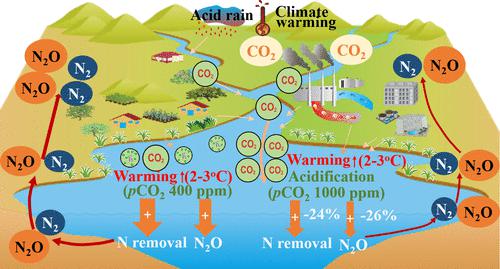当前位置:
X-MOL 学术
›
Environ. Sci. Technol.
›
论文详情
Our official English website, www.x-mol.net, welcomes your feedback! (Note: you will need to create a separate account there.)
Acidification Offset Warming-Induced Increase in N2O Production in Estuarine and Coastal Sediments
Environmental Science & Technology ( IF 11.4 ) Pub Date : 2024-03-05 , DOI: 10.1021/acs.est.3c10691 Xiaofei Li 1, 2 , Mengting Qi 2 , Qiuxuan Li 2 , Boshuang Wu 1 , Yuxuan Fu 1 , Xia Liang 1 , Guoyu Yin 2 , Yanling Zheng 2 , Hongpo Dong 1 , Min Liu 2 , Lijun Hou 1
Environmental Science & Technology ( IF 11.4 ) Pub Date : 2024-03-05 , DOI: 10.1021/acs.est.3c10691 Xiaofei Li 1, 2 , Mengting Qi 2 , Qiuxuan Li 2 , Boshuang Wu 1 , Yuxuan Fu 1 , Xia Liang 1 , Guoyu Yin 2 , Yanling Zheng 2 , Hongpo Dong 1 , Min Liu 2 , Lijun Hou 1
Affiliation

|
Global warming and acidification, induced by a substantial increase in anthropogenic CO2 emissions, are expected to have profound impacts on biogeochemical cycles. However, underlying mechanisms of nitrous oxide (N2O) production in estuarine and coastal sediments remain rarely constrained under warming and acidification. Here, the responses of sediment N2O production pathways to warming and acidification were examined using a series of anoxic incubation experiments. Denitrification and N2O production were largely stimulated by the warming, while N2O production decreased under the acidification as well as the denitrification rate and electron transfer efficiency. Compared to warming alone, the combination of warming and acidification decreased N2O production by 26 ± 4%, which was mainly attributed to the decline of the N2O yield by fungal denitrification. Fungal denitrification was mainly responsible for N2O production under the warming condition, while bacterial denitrification predominated N2O production under the acidification condition. The reduced site preference of N2O under acidification reflects that the dominant pathways of N2O production were likely shifted from fungal to bacterial denitrification. In addition, acidification decreased the diversity and abundance of nirS-type denitrifiers, which were the keystone taxa mediating the low N2O production. Collectively, acidification can decrease sediment N2O yield through shifting the responsible production pathways, partly counteracting the warming-induced increase in N2O emissions, further reducing the positive climate warming feedback loop.
中文翻译:

酸化抵消了变暖引起的河口和沿海沉积物中 N2O 产量的增加
由人为CO 2排放量大幅增加引起的全球变暖和酸化预计将对生物地球化学循环产生深远影响。然而,在变暖和酸化的情况下,河口和沿海沉积物中一氧化二氮(N 2 O)产生的基本机制仍然很少受到限制。在这里,通过一系列缺氧孵化实验检查了沉积物 N 2 O 产生途径对变暖和酸化的响应。变暖在很大程度上刺激了反硝化和N 2 O的产生,而酸化则降低了N 2 O的产生,反硝化率和电子传递效率也随之下降。与单独变暖相比,变暖和酸化相结合使N 2 O产量减少了26±4%,这主要归因于真菌反硝化导致的N 2 O产量下降。升温条件下,真菌反硝化作用主要产生N 2 O,而酸化条件下,细菌反硝化作用主要产生N 2 O。酸化下N 2 O位点偏好的降低反映了N 2 O产生的主要途径可能从真菌反硝化转移到细菌反硝化。此外,酸化降低了nirS型反硝化菌的多样性和丰度,而nirS型反硝化菌是介导低N 2 O产量的关键类群。总的来说,酸化可以通过改变负责任的生产途径来降低沉积物 N 2 O 产量,部分抵消变暖引起的 N 2 O 排放增加,进一步减少气候变暖的正反馈循环。
更新日期:2024-03-05
中文翻译:

酸化抵消了变暖引起的河口和沿海沉积物中 N2O 产量的增加
由人为CO 2排放量大幅增加引起的全球变暖和酸化预计将对生物地球化学循环产生深远影响。然而,在变暖和酸化的情况下,河口和沿海沉积物中一氧化二氮(N 2 O)产生的基本机制仍然很少受到限制。在这里,通过一系列缺氧孵化实验检查了沉积物 N 2 O 产生途径对变暖和酸化的响应。变暖在很大程度上刺激了反硝化和N 2 O的产生,而酸化则降低了N 2 O的产生,反硝化率和电子传递效率也随之下降。与单独变暖相比,变暖和酸化相结合使N 2 O产量减少了26±4%,这主要归因于真菌反硝化导致的N 2 O产量下降。升温条件下,真菌反硝化作用主要产生N 2 O,而酸化条件下,细菌反硝化作用主要产生N 2 O。酸化下N 2 O位点偏好的降低反映了N 2 O产生的主要途径可能从真菌反硝化转移到细菌反硝化。此外,酸化降低了nirS型反硝化菌的多样性和丰度,而nirS型反硝化菌是介导低N 2 O产量的关键类群。总的来说,酸化可以通过改变负责任的生产途径来降低沉积物 N 2 O 产量,部分抵消变暖引起的 N 2 O 排放增加,进一步减少气候变暖的正反馈循环。



























 京公网安备 11010802027423号
京公网安备 11010802027423号